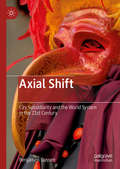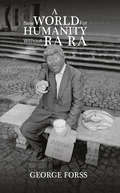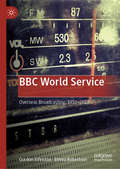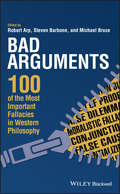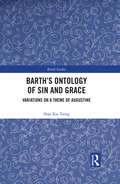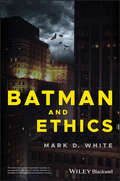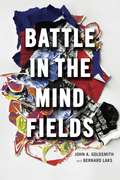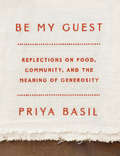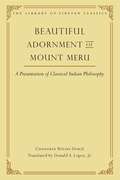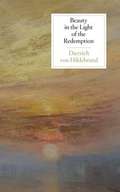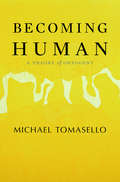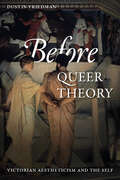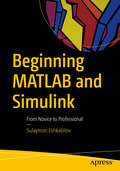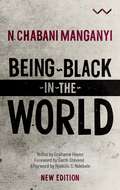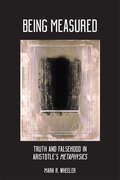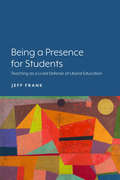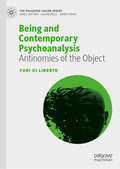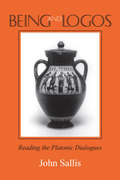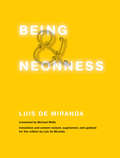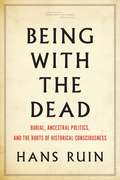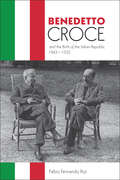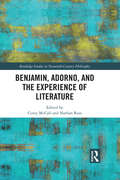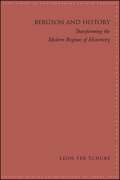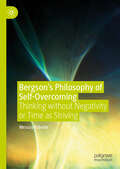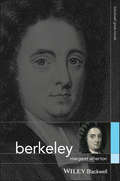- Table View
- List View
Axial Shift: City Subsidiarity and the World System in the 21st Century
by Benjamen GussenThis book uses historical analysis, constitutional economics, and complexity theory to furnish an account of city subsidiarity as a legal, ethical, political, and economic principle. The book contemplates subsidiarity as a constitutional principle, where cities would benefit from much wider local autonomy. Constitutional economics suggests an optimal limit to jurisdictional footprints (territories). This entails preference for political orders where sovereignty is shared between different cities rather states where capital cities dominate. The introduction of city subsidiarity as a constitutional principle holds the key to economic prosperity in a globalizing world. Moreover, insights from complexity theory suggest subsidiarity is the only effective response to the ‘problem of scale.’ It is a fitness trait that prevents highly complex systems from collapsing. The nation-state is a highly complex system within which cities function as ‘attractors.’ The collapse of such systems would ensue if there were strong coupling between attractors. Such coupling obtains under legal monism. Only subsidiarity can make the eventuality of collapse improbable. The emergent and self-organizing properties of subsidiarity entail a shift in policy emphasis towards cities with a wide margin of autonomy.
A New World for Humanity Without Ra Ra
by George ForssA world without Ra Ra is a world for humanity that is placid and secure for a very long time. Ra Ra can mean the way that it sounds (sings) in that this 'mode’ has been the dominant greedy cursory song for the great leaders and saints of all our cultures throughout human history. We always need to have the best people to rule our time-wise cultural advancements and science but now we are going to need to have a check on these! This is so … it is because of an increasing issue that is brewing about our mere survival in this earth home for us. My book details Natural/Spiritual ways that we can be playful and have fun employing remedy to so many of our world's ills. This is the emergency we must face. The fact is that our amazing scientific prowess is making our world an ill place for us. This is something we must deal with. I believe in what I determine to be 'Kindness Solutions’ … that we should operate a cure in this way. We should do this so that we will have a godly joy connected to the fun of such remedies.
BBC World Service: Overseas Broadcasting, 1932–2018
by Emma Robertson Gordon JohnstonThis book is the first full-length history of the BBC World Service: from its interwar launch as short-wave radio broadcasts for the British Empire, to its twenty-first-century incarnation as the multi-media global platform of the British Broadcasting Corporation. The book provides insights into the BBC’s working relationship with the Foreign Office, the early years of the Empire Service, and the role of the BBC during the Second World War. In following the voice of the BBC through the Cold War and the contraction of the British empire, the book argues that debates about the work and purposes of the World Service have always involved deliberations about the future of the UK and its place in the world. In current times, these debates have been shaped by the British government’s commitment to leave the European Union and the centrifugal currents in British politics which in the longer term threaten the integrity of the United Kingdom. Through a detailed exploration of its past, the book poses questions about the World Service’s possible future and argues that, for the BBC, the question is not only what it means to be a global broadcaster as we enter the third decade of the twenty-first century, but what it means to be a national broadcaster in a divided kingdom.
Bad Arguments: 100 of the Most Important Fallacies in Western Philosophy
by Robert Arp Michael Bruce Steven BarboneA timely and accessible guide to 100 of the most infamous logical fallacies in Western philosophy, helping readers avoid and detect false assumptions and faulty reasoning You’ll love this book or you’ll hate it. So, you’re either with us or against us. And if you’re against us then you hate books. No true intellectual would hate this book. Ever decide to avoid a restaurant because of one bad meal? Choose a product because a celebrity endorsed it? Or ignore what a politician says because she’s not a member of your party? For as long as people have been discussing, conversing, persuading, advocating, proselytizing, pontificating, or otherwise stating their case, their arguments have been vulnerable to false assumptions and faulty reasoning. Drawing upon a long history of logical falsehoods and philosophical flubs, Bad Arguments demonstrates how misguided arguments come to be, and what we can do to detect them in the rhetoric of others and avoid using them ourselves. Fallacies—or conclusions that don’t follow from their premise—are at the root of most bad arguments, but it can be easy to stumble into a fallacy without realizing it. In this clear and concise guide to good arguments gone bad, Robert Arp, Steven Barbone, and Michael Bruce take readers through 100 of the most infamous fallacies in Western philosophy, identifying the most common missteps, pitfalls, and dead-ends of arguments gone awry. Whether an instance of sunk costs, is ought, affirming the consequent, moving the goal post, begging the question, or the ever-popular slippery slope, each fallacy engages with examples drawn from contemporary politics, economics, media, and popular culture. Further diagrams and tables supplement entries and contextualize common errors in logical reasoning. At a time in our world when it is crucial to be able to identify and challenge rhetorical half-truths, this bookhelps readers to better understand flawed argumentation and develop logical literacy. Unrivaled in its breadth of coverage and a worthy companion to its sister volume Just the Arguments (2011), Bad Arguments is an essential tool for undergraduate students and general readers looking to hone their critical thinking and rhetorical skills.
Barth's Ontology of Sin and Grace: Variations on a Theme of Augustine (Barth Studies)
by Shao Kai TsengIn recent Barth studies it has been argued that a key to understanding the theologian’s opposition to natural theology is his rejection of substantialist ontology. While this is true to an extent, this book argues that it is a mistake to see Barth’s ‘actualistic ontology’ as diametrically opposed to traditional substantialism. Probing into Barth’s soteriological hamartiology in Church Dogmatics, III-IV, a largely neglected aspect of these volumes in recent debates on his understanding of being and act, it shows how his descriptions of sin, nature, and grace shed light on the precise manners in which his actualistic ontology operates on both a substance grammar of being and a process grammar of becoming, while rejecting the metaphysics underlying both grammars. Looking at issues such as original sin, universal salvation and human will, Barth is shown to be radically redefining the relationship between humans, their actions and the divine. This book argues that human ‘nature’ is the total determination of the human being ‘from above’ by God’s grace in Christ, while the existential dimension of the human being is also totally determined ‘from below’ by the Adamic history of sin. This serves to demonstrate Barth’s endeavours in eliminating the vestiges of natural theology within the Western tradition handed down from Augustine. By exploring these issues this book offers a fresh insight into Barth’s relationship with his theological forbears. As such, it will be vital reading for any scholar of Barth studies, the problem of evil, and theological ontology.
Batman and Ethics
by Mark D. WhiteBatman has been one of the world’s most beloved superheroes since his first appearance in Detective Comics #27 in 1939. Clad in his dark cowl and cape, he has captured the imagination of millions with his single-minded mission to create a better world for the people of Gotham City by fighting crime, making use of expert detective skills, high-tech crime-fighting gadgets, and an extensive network of sidekicks and partners. But why has this self-made hero enjoyed such enduring popularity? And why are his choices so often the subject of intense debate among his fans and philosophers alike? Batman and Ethics goes behind the mask to shed new light on the complexities and contradictions of the Dark Knight’s moral code. From the logic behind his aversion to killing to the moral status of vigilantism and his use of torture in pursuit of justice (or perhaps revenge), Batman’s ethical precepts are compelling but often inconsistent and controversial. Philosopher and pop culture expert Mark D. White uses the tools of moral philosophy to track Batman’s most striking ethical dilemmas and decisions across his most prominent storylines from the early 1970s through the launch of the New 52, and suggests how understanding the mercurial moral character of the caped crusader might help us reconcile our own. A thought-provoking and entertaining journey through four decades of Batman’s struggles and triumphs in time for the franchise’s 80th anniversary, Batman and Ethics is a perfect gateway into the complex questions of moral philosophy through a focused character study of this most famous of fictional superheroes.
Battle in the Mind Fields
by John A. Goldsmith Bernard Laks“We frequently see one idea appear in one discipline as if it were new, when it migrated from another discipline, like a mole that had dug under a fence and popped up on the other side.” Taking note of this phenomenon, John Goldsmith and Bernard Laks embark on a uniquely interdisciplinary history of the genesis of linguistics, from nineteenth-century currents of thought in the mind sciences through to the origins of structuralism and the ruptures, both political and intellectual, in the years leading up to World War II. Seeking to explain where contemporary ideas in linguistics come from and how they have been justified, Battle in the Mind Fields investigates the porous interplay of concepts between psychology, philosophy, mathematical logic, and linguistics. Goldsmith and Laks trace theories of thought, self-consciousness, and language from the machine age obsession with mind and matter to the development of analytic philosophy, behaviorism, Gestalt psychology, positivism, and structural linguistics, emphasizing throughout the synthesis and continuity that has brought about progress in our understanding of the human mind. Arguing that it is impossible to understand the history of any of these fields in isolation, Goldsmith and Laks suggest that the ruptures between them arose chiefly from social and institutional circumstances rather than a fundamental disparity of ideas.
Be My Guest: Reflections on Food, Community, and the Meaning of Generosity
by Priya BasilA thought-provoking meditation on food, family, identity, immigration, and, most of all, hospitality--at the table and beyond--that's part food memoir, part appeal for more authentic decency in our daily worlds, and in the world at large.Be My Guest is an utterly unique, deeply personal meditation on what it means to tend to others and to ourselves--and how the two things work hand in hand. Priya Basil explores how food--and the act of offering food to others--are used to express love and support. Weaving together stories from her own life with knowledge gleaned from her Sikh heritage; her years spent in Kenya, India, Britain, and Germany; and ideas from Derrida, Plato, Arendt, and Peter Singer, Basil focuses an unexpected and illuminating light on what it means to be both a host and a guest. Lively, wide-ranging, and impassioned, Be My Guest is a singular work, at once a deeply felt plea for a kinder, more welcoming world and a reminder that, fundamentally, we all have more in common than we imagine.
Beautiful Adornment of Mount Meru (Library of Tibetan Classics)
by Donald Lopez Changkya Rölpai DorjéThe most lucid and penetrating survey of classical Indian philosophy in the Tibetan language.Beautiful Adornment of Mount Meru by Changkya Rölpai Dorjé (1717–86) is a work of doxography, presenting the distinctive philosophical tenets of the Indian Buddhist and non-Buddhist schools in a systematic manner that ascends through increasingly more subtle views. It is a Tibetan corollary to contemporary histories of philosophy. The &“Mount Meru&” of the title is the Buddha&’s teachings, and Changkya&’s work excels in particular in its treatment of the two Mahayana Buddhist schools, the Yogacara (here called the Vijñaptimatra) and the Madhyamaka. Unlike Jamyang Shepa&’s (1648–1722) much longer Great Exposition of Tenets, which was one of the key sources and inspirations for Changkya, Beautiful Adornment is often praised for the clarity of its prose and its economical use of citations from Indian texts. At the same time, like Jamyang Shepa&’s work, Changkya&’s text is not simply a catalog of assertions; it skillfully examines core philosophical issues, including a number of intriguing ancillary discussions. Also like Jamyang Shepa&’s text, Changkya&’s is very much a Geluk work, drawing heavily on the works of Tsongkhapa and his disciples. The manageable size of Beautiful Adornment and, more importantly, its lucid literary style, made this work the classic source for the study of Indian thought, used by students the across Tibetan cultural sphere. In contemporary academic circles, it has also been a central source for studying the Tibetan interpretation of the classical Indian philosophical systems.
Beauty in the Light of the Redemption
by Dietrich Von Hildebrand"What importance is to be attributed to beauty in the life of a Christian? What role should it play in the life of those who have been redeemed? What is the relationship between redemption and beauty? Did beauty lose its significance after the redemption?" These are some of the questions the author answers in this collection of essays, which introduces his philosophy of art, truth, and beauty.
Becoming Human: A Theory of Ontogeny
by Michael TomaselloVirtually all theories of how humans have become a distinctive species focus on evolution. Here, Michael Tomasello proposes a complementary theory focused on ontogenetic processes. Built on the essential ideas of Vygotsky, his data-driven model explains how those things that make us most human are constructed during the first six years of life.
Before Queer Theory: Victorian Aestheticism and the Self
by Dustin FriedmanA reimagining of how the aesthetic movement of the Victorian era ushered in modern queer theory.Late Victorian aesthetes were dedicated to the belief that an artwork's value derived solely from its beauty, rather than any moral or utilitarian purpose. Works by these queer artists have rarely been taken seriously as contributions to the theories of sexuality or aesthetics. But in Before Queer Theory, Dustin Friedman argues that aestheticism deploys its "art for art's sake" rhetoric to establish a nascent sense of sexual identity and community.Friedman makes the case for a claim rarely articulated in either Victorian or modern culture: that intellectually, creatively, and ethically, being queer can be an advantage not in spite but because of social hostility toward nonnormative desires. Showing how aesthetes—among them Walter Pater, Oscar Wilde, Vernon Lee, and Michael Field—harnessed the force that Georg Wilhelm Friedrich Hegel called "the negative," Friedman reveals how becoming self-aware of one's sexuality through art can be both liberating and affirming of humanity's capacity for subjective autonomy.Challenging one of the central precepts of modern queer theory—the notion that the heroic subject of Enlightenment thought is merely an effect of discourse and power—Friedman develops a new framework for understanding the relationship between desire and self-determination. He also articulates an innovative, queer notion of subjective autonomy that encourages reflecting critically on one's historical moment and envisioning new modes of seeing, thinking, and living that expand the boundaries of social and intellectual structures. Before Queer Theory is an audacious reimagining that will appeal to scholars with interests in Victorian studies, queer theory, gender and sexuality studies, and art history.
Beginning MATLAB and Simulink: From Novice to Professional
by Sulaymon EshkabilovEmploy essential and hands-on tools and functions of the MATLAB and Simulink packages, which are explained and demonstrated via interactive examples and case studies. This book contains dozens of simulation models and solved problems via m-files/scripts and Simulink models which help you to learn programming and modeling essentials. You’ll become efficient with many of the built-in tools and functions of MATLAB/Simulink while solving engineering and scientific computing problems. Beginning MATLAB and Simulink explains various practical issues of programming and modelling in parallel by comparing MATLAB and Simulink. After reading and using this book, you'll be proficient at using MATLAB and applying the source code from the book's examples as templates for your own projects in data science or engineering. What You Will LearnGet started using MATLAB and SimulinkCarry out data visualization with MATLABGain the programming and modeling essentials of MATLABBuild a GUI with MATLABWork with integration and numerical root finding methodsApply MATLAB to differential equations-based models and simulationsUse MATLAB for data science projectsWho This Book Is ForEngineers, programmers, data scientists, and students majoring in engineering and scientific computing.
Being Black in the World
by N. Chabani ManganyiAn annotated edition of a classic text by South Africa's first black psychologist, a collection of essays reflecting on what it meant to be black during the apartheid yearsBeing-Black-in-the-World, one of N. Chabani Manganyi’s first publications, was written in 1973 at a time of global socio-political change and renewed resistance to the brutality of apartheid rule and the emergence of Black Consciousness in the mid-1960s. Manganyi is one of South Africa’s most eminent intellectuals and an astute social and political observer. He has written widely on subjects relating to ethno-psychiatry, autobiography, black artists and race. In 2018 Manganyi’s memoir, Apartheid and the Making of a Black Psychologist was awarded the prestigious ASSAf (The Academy of Science of South Africa) Humanities Book Award. Publication of Being-Black-in-the-World was delayed until the young Manganyi had left the country to study at Yale University. His publishers feared that the apartheid censorship board and security forces would prohibit him from leaving the country, and perhaps even incarcerate him, for being a ‘radical revolutionary’. The book found a limited public circulation in South Africa due to this censorship and original copies were hard to come by.This new edition is an invitation to a younger generation of citizens to engage with early decolonialising thought by an eminent South African intellectual. While the essays in this book are clearly situated in the material and social conditions of that time, they also have a timelessness that speaks to our contemporary concerns regarding black subjectivity, affectivity and corporeality, the persistence of a racial (and racist) order and the possibilities of a renewed de-colonial project. Each of these short essays can be read as self-contained reflections on what it meant to be black during the apartheid years. Manganyi is a master of understatement, and yet this does not stop him from making incisive political criticisms of black subjugation under apartheid. The essays will reward close study for anyone trying to make sense of black subjectivity and the persistence of white insensitivity to black suffering. Ahead of its time, the ideas in this book are an exemplary demonstration of what a thoroughgoing and rigorous de-colonial critique should entail. The re-publication of this classic text is enriched by the inclusion of a foreword and annotation by respected scholars Garth Stevens and Grahame Hayes respectively, and an afterword by public intellectual Njabulo S. Ndebele.
Being Measured: Truth and Falsehood in Aristotle's Metaphysics (SUNY series in Ancient Greek Philosophy)
by Mark R. WheelerOn the basis of careful textual exegesis and philosophical analysis of Aristotle's Metaphysics, Mark R. Wheeler offers a groundbreaking interpretation of Aristotle's theory of truth in terms of measurement. Wheeler demonstrates that Aristotle's investigation of truth and falsehood in the Metaphysics is rigorously methodical, that Aristotle's conceptions of truth contribute to the main lines of thought in the treatise, and that the Metaphysics, taken as a whole, contributes fundamentally to Aristotle's theory of truth. Wheeler provides not only an excellent introduction to the main problems in the theory of truth but also provides contemporary truth theorists with a rigorous explanation of Aristotle's theory of truth.
Being a Presence for Students: Teaching as a Lived Defense of Liberal Education
by Jeff FrankThis book offers a lived defense of liberal education. How does a college professor, on a daily basis, help students feel the value of liberal education and get the most from that education? We answer this question, as professors, each day in the classroom. John William Miller, a philosophy professor at Williams College from 1924-1960 and someone noted for his exceptional teaching, developed one form that this lived defense can take. Though Miller published very little while he was alive, the archives at Williams College hold unpublished notes and essays of this master teacher. In this book, Jeff Frank offers an extended commentary on one of these unpublished essays where Miller develops his thinking on liberal education. Frank develops the idea that presence is central to liberal education and offers suggestions for how professors can become an educative presence for students. The goal of this book is an invitation to other professors who value liberal education to think with Miller about how to develop their own lived defense of liberal education, each day, in their own classrooms. The tone of the book is meant to be invitational, at times even conversational, and the book concludes with some direct suggestions for how professors can live their own defense of liberal education.
Being and Contemporary Psychoanalysis: Antinomies of the Object (The Palgrave Lacan Series)
by Yuri Di LibertoThis book explores how philosophical realisms relate to psychoanalytical conceptions of the Real, and in turn how the Lacanian framework challenges basic philosophical notions of object and reality. The author examines how contemporary psychoanalysis might respond to the question of ontology by taking advantage of the recent revitalization of realism in its speculative form. While the philosophical side of the debate makes a plea for an independent ontological consistency of the Real, this book proposes a Lacanian reassessment of the definition of the Real as ‘what is foreign to subjectivity itself’. In doing so, it reframes the question of the Real in terms of what is already there beneath the supposedly linguistic constitution of subjectivity. The book then goes on to engage the problem of cognition in the realm of Nature qua materiality, focusing on the centrality of the body as a linguistic-material hybrid. It argues that it is possible to re-establish the theoretical dignity of Ricoeur’s notion of ‘suspicion’, by building a dialogue between Lacanian psychoanalysis and three main domains of inquiry: desire, objects and bodily enjoyment. Borrowing from Piera Aulagnier’s theory of the Other as a word-bearer, it considers the genesis of desire and sense of reality both explainable through a hybrid framework which comprises psychoanalytical insights and material dynamics in a comprehensive account. This created theoretical space is an opportunity for both philosophers and psychoanalysts to rethink key Lacanian insights in light of the problem of the Real.
Being and Logos: Reading the Platonic Dialogues (The\collected Writings Of John Sallis Ser. #I, 2)
by John SallisAn exercise in the careful reading of the dialogues in their originary character.“Being and Logos is . . . a philosophical adventure of rare inspiration . . . Its power to illuminate the text . . . its ecumenicity of inspiration, its methodological rigor, its originality, and its philosophical profundity—all together make it one of the few philosophical interpretations that the philosopher will want to re-read along with the dialogues themselves. A superadded gift is the author’s prose, which is a model of lucidity and grace.” —International Philosophical Quarterly“Being and Logos is highly recommended for those who wish to learn how a thoughtful scholar approaches Platonic dialogues as well as for those who wish to consider a serious discussion of some basic themes in the dialogues.” —The Academic Reviewer
Being and Neonness, Translation and content revised, augmented, and updated for this edition by Luis de Miranda (The\mit Press Ser.)
by Luis De MirandaA cultural and philosophical history of neon, from Paris in the twentieth century to the perpetually switched-on present day.For most of us, the word neon conjures images of lights, colors, nightlife, and streets. It evokes the poetry of city nights. For Luis de Miranda, neon is a subject of philosophical curiosity. Being and Neonness is a cultural and philosophical history of neon, from early twentieth-century Paris to the electric, perpetually switched-on present day Manhattan. It is an inspired journey through a century of night, deciphering the halos of the past and the reflections of the present to shed light on the future.Invented in Paris in 1912, neon first appeared on a modest but arresting sign outside a small barbershop; the sign lit up number 14, Boulevard Montmartre, attracting so many passersby that the barber's revenues soon doubled. A century later, neon is no longer just a sign; it is a mythic object—a metonymy of contemporary identity and a metaphor for the present, signifying the ubiquity of commerce and the tautology of hypermodernity. But perhaps the noble gas of neon whispers something more, something deeper? In ten short, poetic yet precise chapters, de Miranda explores the neon lights of the twentieth century. He considers, among other historical curiosities, the neon compulsions of the Italian Futurists; the Soviet program of “neonization”; the Nazi's deployment of neon for propaganda purposes; Baudelaire's “halo” and Benjamin's “aura”; neon as a gas and crystallized chaos; neon and power; neon and capitalism—all of this backlit by an original reading of Sartre's Being and Nothingness. This English edition has been thoroughly revised and adapted from the French edition, L'être et le neon.
Being with the Dead: Burial, Ancestral Politics, and the Roots of Historical Consciousness (Cultural Memory in the Present)
by Hans RuinPhilosophy, Socrates declared, is the art of dying. This book underscores that it is also the art of learning to live and share the earth with those who have come before us. Burial, with its surrounding rituals, is the most ancient documented cultural-symbolic practice: all humans have developed techniques of caring for and communicating with the dead. The premise of Being with the Dead is that we can explore our lives with the dead as a cross-cultural existential a priori out of which the basic forms of historical consciousness emerge. Care for the dead is not just about the symbolic handling of mortal remains; it also points to a necropolitics, the social bond between the dead and living that holds societies together—a shared space or polis where the dead are maintained among the living. Moving from mortuary rituals to literary representations, from the problem of ancestrality to technologies of survival and intergenerational communication, Hans Ruin explores the epistemological, ethical, and ontological dimensions of what it means to be with the dead. His phenomenological approach to key sources in a range of fields gives us a new perspective on the human sciences as a whole.
Benedetto Croce and the Birth of the Italian Republic, 1943–1952 (Toronto Italian Studies)
by Fabio RiziAs president of the Italian Liberal Party, Benedetto Croce was one of the most influential intellectuals involved in Italian public affairs after the fall of Mussolini. Placing Croce at the centre of historical events between 1943 and 1952, this book details his participation in Italy’s political life, and his major contributions to the rebirth of Italian democracy. Drawing on a great amount of primary material, including Croce’s political speeches, correspondences, diaries, and official documents from post-war Italy, this book illuminates the dynamic and progressive nature of Croce’s liberalism and the shortcomings of the old Liberal leaders. Providing a year-by-year account of Croce’s initiatives, author Fabio Fernando Rizi fills the gap in Croce’s biography, covering aspects of his public life often neglected, misinterpreted, or altogether ignored, and restores his standing among the founding fathers of modern Italy.
Benjamin, Adorno, and the Experience of Literature (Routledge Studies in Twentieth-Century Philosophy)
by Nathan Ross Corey McCallThis collection features original essays that examine Walter Benjamin’s and Theodor Adorno’s essays and correspondence on literature. Taken together, the essays present the view that these two monumental figures of 20th-century philosophy were not simply philosophers who wrote about literature, but that they developed their philosophies in and through their encounters with literature. Benjamin, Adorno, and the Experience of Literature is divided into three thematic sections. The first section contains essays that directly demonstrate the ways in which literature enriched the thinking of Benjamin and Adorno. It explores themes that are recognized to be central to their thinking—mimesis, the critique of historical progress, and the loss and recovery of experience—through their readings of literary authors such as Baudelaire, Beckett, and Proust. The second section continues the trajectory of the first by bringing together four essays on Benjamin’s and Adorno’s reading of Kafka, whose work helped them develop a distinctive critique of and response to capitalism. The third and final section focuses more intently on the question of what it means to gain authentically critical insight into a literary work. The essays examine Benjamin’s response to specific figures, including Georg Büchner, Robert Walser, and Julien Green, whose work he sees as neglected, undigested, or misunderstood. This book offers a unique examination of two pivotal 20th-century philosophers through the lens of their shared experiences with literature. It will appeal to a wide range of scholars across philosophy, literature, and German studies.
Bergson and History: Transforming the Modern Regime of Historicity (SUNY series in Contemporary French Thought)
by Leon ter SchureHenri Bergson is famous for his explorations of time as duration, yet he rarely referred to history in his writings. Simultaneously, historians and philosophers of history have generally disregarded Bergson's ideas about the nature of time. Modernity has brought change at an ever-accelerating rate, and one of the results of this has been a tendency toward presentism. Only the here and now matters, as past and future have been absorbed by the "omnipresent present" of the digital age. In highlighting the role of history in the work of Bergson, Bergson and History shows how his philosophy of life allows us to revise the modern conception of history. Bergson's philosophy situates history within a broader framework of life as a creative becoming, allowing us to rethink important topics in the study of history, such as historical time, the survival of the past, and historical progress.
Bergson’s Philosophy of Self-Overcoming: Thinking without Negativity or Time as Striving
by Messay KebedeThis book proposes a new reading of Bergsonism based on the admission that time, conceived as duration, stretches instead of passes. This swelling time is full and so excludes the negative. Yet, swelling requires some resistance, but such that it is more of a stimulant than a contrariety. The notion of élan vital fulfills this requirement: it states the immanence of life to matter, thereby deriving the swelling from an internal effort and allowing its conceptualization as self-overcoming. With self-overcoming as the inner dynamics of reality, Bergson dismisses all forms of dualism and reductionist monism because both the absence of negativity and the swelling nature of time posit a creative process yielding a qualitatively diverse world. This graded oneness is how the lower level activates intensification by turning into limitation, making possible higher levels of achievement, in particular through the union of mind and body and the integration of openness and closed sociability.
Berkeley: Critical Essays On Locke, Berkeley, And Hume (Blackwell Great Minds)
by Margaret AthertonPresents a concise and comprehensive analysis of George Berkeley’s thought and the impact of his intellectual contributions to philosophy In this latest addition to the Blackwell Great Minds series, noted scholar of early modern philosophy Margaret Atherton examines Berkeley’s most influential work and demonstrates the significant conceptual impact of his ideas in metaphysics and the philosophy of religion. A concise and rigorous primer on Berkeley’s essential writings and contributions to modern philosophy Written by a leading scholar of early modern philosophy Offers insight into the foundations of modern metaphysical and religious philosophy Equips readers to find firm footing in Berkeley’s wider body of published work in the canon of Western philosophy
